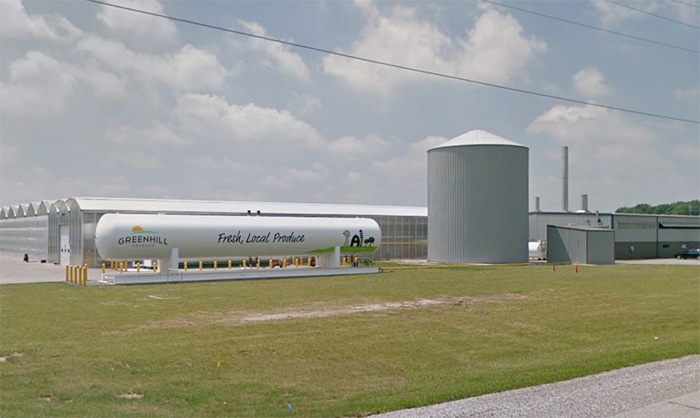
By Bruce Corcoran
A Kent Bridge greenhouse now reports 40 COVID-19 positive cases, and fears such widespread infection could seriously impact its bottom line.
Justin Geertsema, vice president and general manager of Greenhill Produce, confirmed 11 employees tested positive by Sunday afternoon, another 11 positives came back Sunday night, and a further 17 were reported Monday morning. All from a workforce of about 250 people.
“Everyone is in isolation and nobody is in the hospital. Everybody’s doing OK so far,” Geertsema told The Chatham Voice on Monday. “Whoever has symptoms, so far they are mild. We are thankful for that.”
As of Monday afternoon, there were a reported 75 cases of COVID-19 in Chatham-Kent, 40 of which came from Greenhill.
Geertsema said that as of Monday morning, Greenhill had received approximately 100 negative tests results, and said not all the results are in as of yet.
“The affected employees are members of our migrant workforce and all have been living in Chatham-Kent for at least four months and up to 18 months. We currently have 113 migrant workers living here, from Jamaica, Mexico and Guatemala,” according to a Greenhill media release.
Dr. David Colby, Chatham-Kent’s medical officer of health, said isolation rules are in effect at Greenhill, a 125-acre facility that produces various types of sweet peppers.
“We are diligently isolating everybody. We’re isolating all the positives, all the symptomatics and all contacts of the positives and symptomatics. That means isolating entire bunkhouses,” he said.
Geertsema and Colby said they aren’t sure how COVID-19 got into Greenhill.
Colby said the majority of the infected workers have been here for months, some as long at 18 months.
“There were some that arrived about a month ago, there were some who went on vacation back to their originating country and then returned. But all underwent the federal 14-day quarantine,” he said. “It’s still not clear exactly how this got going there.”
Fifteen migrant workers recently arrived at Greenhill Produce and were placed in isolation as per federal requirements. None has had contact with the affected employees or any other employees during their isolation.
The cases started showing up last Wednesday, as there were six cases of COVID-19 confirmed in the workforce April 22. All six were from Guatemala and have been Chatham-Kent residents for 18 months, according to Greenhill officials.
Once COVID-19 got inside Greenhill, Colby said it’s easy to see how it quickly spread.
“The bunkhouse environment with common cooking and socializing areas – these guys are like any other guys in a workhouse environment. They socialize with one another after hours. That facilitates the relatively easy transfer once it gets in there,” he said.
Colby said CK Public Health has known about the situation at Greenhill for several days. It did not inform the public, as the greenhouse does not interact directly with the public.
“When it comes to a private outfit that does not have any public interaction, it’s really the responsibility of the company to issue a press release on that,” he said, and that is just what Geertsema did. “Had there been a public safety issue, we’d have issued the release.”
With so many people in isolation, Geertsema said that is now a production problem for the company.
“We start harvesting in our year-round production in the beginning of March. We harvest five days a week until November,” he said. “But right now, production is a struggle. With 39 cases and other isolations, there is almost half our workforce in quarantine. We’re uncertain what our future looks like right now.”
He added there has been a “great outpouring of positive support. We are just so grateful.”
Geertsema is asking for a little more support in the form of able bodies. He said if anyone wants to help with the harvest, they could call 519-692-3477.
Meanwhile, Colby said there is no need to fear the vegetables would be contaminated by COVID-19 when they get to grocery stores.
“We are on this. There is no reason to fear. There is no reason to think any food products are unsafe,” he said. “Most of our food, in the colder months especially, is imported. If this was a problem, we would see a different dynamic of infection across the world. This does not appear to be food borne at all.”
Colby said through the normal shipping and distribution processes, “even if the virus was there, and that’s very unlikely, it will not survive the shipping to grocery stores. It’s just not an issue.”






